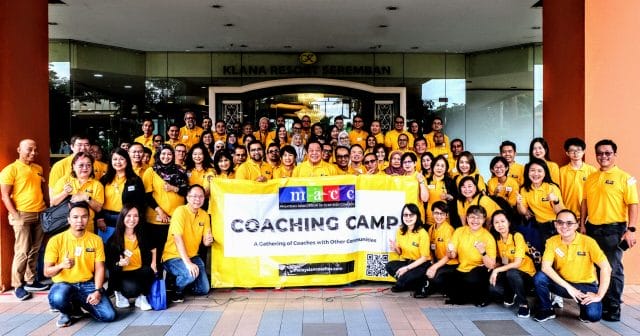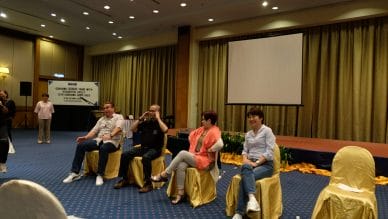Do you desire to transform your workplace with a Coaching Culture but not sure how to do it? Here are 4 time-tested, successful models used by 4 senior coach-leaders in their organizations. This was shared in an interactive Fireside Chat at the recent Malaysian Association of Certified Coaches (MACC) Coaching Camp held on 14th October 2023.
Model 1: Coaching Soup and Coffee Coaching
Coaching is done informally in my company, in our daily chats and over coffee counter. By coaching soup, it means that everyone is involved from leaders to team members but of course, the ingredient has to start with the top leadership. I chose coaching because the company needs talent but often people don’t see themselves and prefer to be told what to do. They need someone to lift them up and to get them up and running. Coaching can do this because your people will walk their own journey, be happy with what they do and in turn, they will support the company’s system. One of the biggest result we reaped was that no one got retrenched during the Covid-19 pandemic because everyone was open to change and had the coaching mindset.
Peter Wyss, CMC, MBA is an entrepreneur and Group CEO of PMCC Corporation. He is the author of “AI Driven Successes” and has significantly impacted the project management sphere, continually advocating for mentorship and coaching.
Model 2: Internal Coach Trainings
In Top Glove, coaching culture became the DNA of the company. I was a firm believer in coaching and convinced the company to send me for ICF Certification Program. After my learnings, I implemented internal certification programs for the company on 4 levels. Level 1 is for all staff on awareness about coaching. Level 2 is for Managers who are serious about coaching. Level 3 is for those who coach people within their Department and Level 4 is for those who coach people outside their Department. For Level 3 and Level 4, they can clock-in coaching hours for professional development. We celebrate small wins and hear success stories from both the coaches and coachees.
Dr Jessica Tang CAC, PhD is an entrepreneur, trainer and coach. She was the Deputy General Manager, Group Human Resources for Top Glove. She has won many awards for the companies she worked for, the most recent being the “HR Minister Award” by HRD Corp, 2022.
Model 3: External Coach Trainings
I started the coaching journey in Onsemi 8 years ago because I believe there is a strong business case for coaching. Gallup study shows that 85% of employees worldwide have work-related issues that affect their physical and mental health. Coaching addresses the basic human needs that employees want autonomy, they want to be recognized as competent and to be connected with others. Every year, I get staff to be certified as coaches with CCA and 10% of the staff’s KPI is to get Coaching Certification. It’s a big investment for the company and my challenge is to ensure every employee has a coach who meets with them every month. During coaching, some people leave but we retain better people. I will continue to push the needle to implement the coaching culture. When employees acquire both attitude and attributes, they will have high potential. There is no perfect plan, so just do it!
Kamaldin Nordin, CMC is currently a HR Senior Director at Onsemi. He has the responsibility for SEA Region & HR Business Partner for Asia Assemby and Test Operations. He is passionate in Delivery value to organization. Develop leaders.
Model 4: Hire External Coaches
As an external coach, you have the benefit of someone looking in the organization. You have the golden opportunity to create awareness to introduce coaching into the organization. The issue can lie with the leader and as an external coach, you need to educate the leader that they have a part to play in this. There must be alignment among the 3 parties; the boss, the staff and the coach. Include the leader in the review sessions and give real feedback. Indirectly, you are coaching the leader and this brings value to the organization. The organization can have a balance of internal and external coaches to weigh the effectiveness versus cost factors. External coaches work better for top management leaders but for lower positions, it is best to have internal capabilities.
Susan Ong, ICF-PCC, Certified HRDC Trainer is a Leadership & Executive Coach. She is the founder of Coachbiz and brings with her a wealth of over 25 years of experience from various local conglormerates and multinational industries.
Corporate Coach Academy is the World’s Top 3 ICF Coaching School and Top Coaching Provider in Malaysia. It is known for its ICF coaching programs and offers the best executive coaching programs with 3 learning options.

